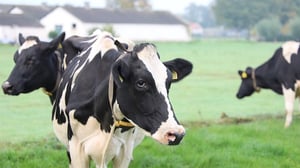 It's no surprise that cows are a dairy farmer's main concern. After all, if dairy farming is your livelihood, then it's important to take care of the animals that produce the main ingredient of all dairy products.
It's no surprise that cows are a dairy farmer's main concern. After all, if dairy farming is your livelihood, then it's important to take care of the animals that produce the main ingredient of all dairy products.
However, cows are not the only essential part of an effective and efficient dairy farm. Flooring is a major component. The right flooring can lay the groundwork for successful farming, and consequently, the wrong flooring can introduce serious problems to your farming.
Let's delve into some of the most prevalent challenges that dairy farmers face when it comes to flooring. After all, it's necessary to be aware of your challenges in order to address them.
Sanitation
Sanitation is essential in any industry that produces food for consumption. Maintaining a hygienic environment is especially necessary when it comes to dairy products. One reason for this is because dairy products are one of the most highly consumed foods available in terms of quantity and one of the most frequently consumed foods by children.
Because the demand for dairy is so high, most farmers produce it in large quantities, making sanitation that much more challenging to the dairy farmer's process. The rest of this blog will address how installing the wrong flooring at a dairy farm compromises sanitation.
Heavy workloads
From rubber boots and cattle hooves that scuff farm floors to the weight of forklift trucks and other large machinery, the workload at a dairy farm is immense and unforgiving.
The result is often cracks in the flooring. Cracks are a serious problem for flooring because they compromise sanitation. Cracked floors are quick to become contaminated when a spillage seeps into those cracks and crevices. Once spills lodge into a crack or other small space, bacteria builds up, and even with intense cleaning routines, it's difficult — if not impossible — to get rid of. The same happens with seams in a floor.
This is why urethane cement floors are ideal for dairy farms. Urethane cement is strong enough to stand up to heavy workloads, and it's also an impervious material, meaning it won't absorb liquids that could corrode or contaminate the floor. Additionally, concrete, unlike wood and other flooring options, will not disintegrate after an event as likely as a lactic acid spillage.
Frequent washes
Dairy farmers strive to attain and maintain Grade A dairy status. In order to do that, dairy farmers must have floors and walls that are impervious and washable, according to the Pasteurized Milk Ordinance (PMO).
Achieving this requirement demands flooring that's strong enough to withstand frequent washes. Many floors erode under the pressure of intense cleanings, and once the coating of your impervious floor is damaged, the entire floor becomes porous and ineffective.
In addition to strength, dairy farm floors should be smooth and level in order for cleaning to be effective. As stated previously, a floor with cracks and crevices create areas that are impossible to clean. Floors need to be level so that puddles do not develop. Puddles not only present a hygienic hazard, but depending on what type of liquid the puddle is, it could corrode the floor — or at least the surface layer of the floor. Frequent puddling creates the need for more frequent washing, which is unnecessarily taxing on your dairy farm floor.
Unprotected concrete floors are the bane of dairy farm floors because they are likely to deteriorate from hot water cleanings as well as harsh chemicals used to eliminate dangerous and resilient microorganisms.
Organic chemical attacks and thermal shock
In a dairy farm's milking areas, organic chemical attacks and thermal shock are likely. While an epoxy floor is strong, it is not quite as strong as a urethane cement floor, and it would likely crack or de-bond if exposed to such elements.
Joint between floor and wall
Just like cracks in the floor can create a home for bacteria to thrive, there is another place at dairy farms where bacteria is known to accumulate. It's the joint between the floor and the wall. This space is difficult to clean, which is why the PMO advises that joints be tight, impervious and either coved in design or sealed. Adherence to this advice is most important in places where milk is produced, handled, processed or stored.
A coved joint replaces the traditional sharp corner and gap with a rounded corner to create a seamless transition between the floor and wall surfaces. The coving design is much easier to clean. The main requirement is that it is as resilient and durable as the floor is so that it doesn't corrode and become otherwise damaged when exposed to heat, cleaning, etc.
Drainage
Think of all of the liquid and fecal matter that the floors of a dairy farm endure. Proper drainage is essential to sanitation and safety.
In order for drainage to work efficiently, a floor must be completely impervious, smooth and appropriately sloped.
- Impervious flooring ensures that urine, milk and other liquids do not seep into the floor before they can drain away.
- Smooth floors ensure that liquids do not get trapped in cracks on their journey to the drain
- A sloped floor is essential in order for these liquids to reach a drain as quickly as possible. Without a slope that leads to a covered floor drain, liquids will puddle until they are manually removed during cleaning.
Let's get started on your urethane cement floor!
CPC is your general contractor for dairy farm flooring. We know concrete flooring, and we've also been in the industry long enough to understand that every facility needs something a little bit different. Contact us today with questions about your flooring options or to request a quote on a floor installation at your dairy farm.

